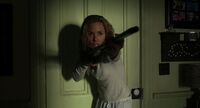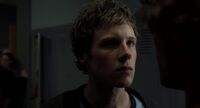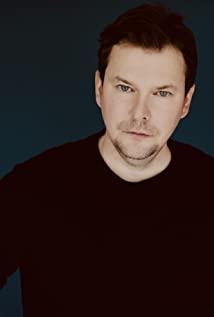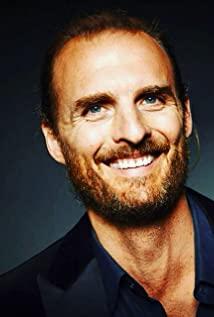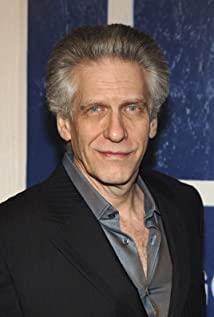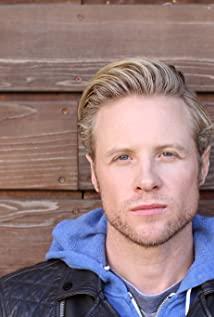Recently, my grasp of the text is relatively poor. I have repeatedly deleted and deleted a lot of redundant words and succinctly written them casually (the short comments cannot be placed..
What this film shows is how violence arises, rather than discussing violence, discussing what violence means in an environment with many social meanings and concepts, the film does not emphasize death and the end of life and the The meaning of killing is based on the context. The beginning of the chapter takes the violence of two inexplicable murders as the source, symbolizing that the violence itself is the origin of violence, which seems to point to a certain universality in human nature, symbolizing that violence comes from an unsolvable established fact. Using this part as the reason for the other people in the film to drive the murderous atrocities, then create a series of troubles that prompts them to have constant trouble-solving behaviors, and the only way for them to solve the troubles is to return to violence. The sexual passion generated during the couple’s argument in the stairwell implies that violence comes from desire and weakness in human nature, and the most powerless and vulnerable way to face rejection (violence) is violence (sex). Violence comes from subtle influence and education, just as a son is influenced by his father. Facing the troubles and troubles brought about by violence can only be solved by endless violence (continuous killing). The end of the violent history of the film is the tearful eyes, the pain and the brokenness.
The history of violence is more like the structure of violence, or the history of human nature, in which is all the history related to human nature. A person who has been omitted from the history of thugs and has become a person with almost perfect character, has a very close love and a warm family, has established a good relationship with others, and can see the shadow of a person's strong willpower from the way of communication, Or a person's ability is reflected in the life world around him. The most important structure of violence is willpower, which can be a determinant of a person's abilities. I am not surprised when he kills people calmly with a gun, because his willpower is likely to make him strong enough to protect the important things in his heart, that is, the bravery that produces heroism. The healthy and happy life shown in the film requires not only bravery, but also keen and intelligent judgment and control of others and oneself, which I understand as a person's ability. In emergencies, his willpower can allow him to make a very good response to solve the immediate difficulties. The observation and acuity of people learned by the son in the family made him use a very clever counterattack when facing the violence of his classmates for the first time, and after witnessing his father's brave ability for the second time, he fought back with a very strong way. Classmates, and then later killed someone to save his father. In this history of violence, what he has learned is not only courage but also exercise of will. In the film, there are a lot of eye-to-eye confrontations, and what he is competing and showing is a A certain strength in a person's heart, when such a powerful expression expresses a certain inner energy, with bravery and firm belief as an external manifestation, these are different aspects of a person's ability.
Look at why a person does it, not what the person does.
The very exciting psychological dramas are all caught in the eyes of the actors, and I have been reminiscing about them for a long time after watching them. This is the director's subtle insight. From this, the depth of the movie can be seen as a whole. The composure in the restaurant, the remorse when I appear when I watch the news, and even every grateful love language and polite and caring greetings, including caring for my son and daughter, intimate love with my wife and whole-hearted love. Very well drawn. The change in the eyes when killing people on the lawn is very sharp, so handsome, the very powerful inner strength is all in the eyes, including the change in the eyes when he sees his son killing someone, he seems to be saying that he would rather his son not use it to save him. The loss of violence, and then the anger that warns his son to admonish him to stay away from violence, and the comfort and embrace of the soft down after the loss. There are also complex changes in the expressions of the wife and the police officer who are also wondering the truth, from watching, confrontation and interrogation, and finally breaking down when she realizes it is just from her curiosity. I still love my husband, and I accept who my husband is has nothing to do with the love between them. The psychological capture of these three scenes is too wonderful.
The film's discussion of violence was mentioned in the teacher's class as an example. I just watched it, and I recently remembered it.
But I have to say that the rape scene on the stairs is amazing, because the wife also realizes that the powerlessness of sex is part of the violence of instinct, and she cannot resist.
Vigo, a handsome and ruthless killer, can have a certain kind of modest sunshine at the same time. That woman won't fall in love with it. She really has no resistance. I can't help but love this one. There is a kind of magnanimity in him that thoroughly washes and traverses all the dark and light corners of human nature. This is the feeling of sunshine on him. It is like completely facing all the elements of human nature, and only after truly understanding violence. To the preciousness of love and peace, I have a deep hatred of violence, and after the firm will to restrain the impact of violence on myself because of the self-control brought about by my experience, I become a person who does it from the bottom of my heart. Make a real decision and become such a firm, humble and grateful good person.
The director carries his thoughts on violence in a simple story based on the psychological thickness of the characters. These two points are very powerful. One is the concise and neat application of the image logic of the concept, and the design is also ingenious, using the narrative structure and contrast. The different emphasis and contrasts highlight the various concepts extended to violence. The second is the scheduling of actors and the shaping of characters, which support the ineffable part of the logic of the entire argument. It is in the details that the director is good at penetrating the subtleties of human feelings. Grid's smartest place.
View more about A History of Violence reviews



